WMG News
I-Trace next step in WMG’s Cyber Security research partnership with Smart infrastructure company Costain
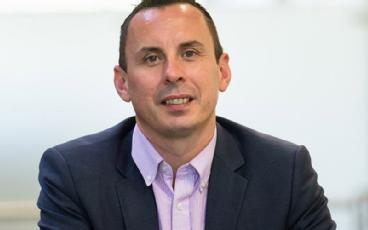 Smart infrastructure company Costain have just announced that they are joining I-Trace, a part-government funded project led by Cisco and involving a consortium of partners including WMG at the University of Warwick, BT and Senseon to conduct cybersecurity trials in real-world infrastructure settings.
Smart infrastructure company Costain have just announced that they are joining I-Trace, a part-government funded project led by Cisco and involving a consortium of partners including WMG at the University of Warwick, BT and Senseon to conduct cybersecurity trials in real-world infrastructure settings.
WMG have already been working closely with Costain on an IoT (internet of things)-enabled Data across the Supply Chain (SIDS) project, which is funded by the WMG Centre High Value Manufacturing (HVM) Catapult. That project aims to develop a set of principles of cyber secure data sharing in a networking infrastructure, such as a manufacturing supply chain. The research team, led by WMG’s Professor Carsten Maple, hoped to allow businesses to take a risk-based approach to data sharing, encouraging industries to be more connected.
Professor Maple explains:
“The SIDS project is an integral component of our work in designing secure and resilient supply chains. Within a smart factory, you are in control of your own data. But if you start to add other parties into that, you need to understand what the risks are and how to mitigate them. For example, if you can turn your production system on via a mobile phone, you need to know the cyber security credentials of the network provider, the phone manufacturer, the app developer and so on.”
Professor Maple and his team at WMG at the University of Warwick have had a long-standing research partnership with Costain, to explore and apply the principles of secure data sharing.
Kevin Reeves, Director of IoT & Digital Twin at Costain, is an Honorary Research Fellow at WMG and he has been working with us to understand how digital manufacturing and production-based approaches can be applied to design and build activities in infrastructure projects as part of a digital transformation programme at Costain. Kevin explains:
“In production, it is all about repeatability. At Costain, we wanted to introduce a greater degree of standardisation into infrastructure projects. This will mean quicker mobilisation, fewer training costs, standard digital tools and services across the business. Doing this means integrating systems with suppliers and clients, which brings new challenges and the need for tighter security.”
Using the principles of secure data sharing developed in the SIDS project, Kevin has worked with WMG to create a digital blueprint of their enterprise system, so that they could assess their vulnerability to cyber-attacks, and shore-up their system, giving assurance to the entire supply chain.
This partnership with WMG has supported Costain in achieving the Cyber Essential Plus Scheme accreditation via the National Cyber Security Centre (NCSC), as well as the globally recognised cyber security international standard, ISO 27001. Costain have now created a specialist cyber security team to continue learning about new cyber threats as they emerge.
Kevin also noted that:
“Our clients increasingly require cyber security credentials before being willing to integrate their systems with ours. While this is a huge opportunity, data sharing and privacy is a massive challenge for industry, and it’s been exacerbated by the increase in remote working due to Covid-19.”
Professor Maple and his team believe one of the challenges for the future will be ensuring the right skills to support integration of supply chains in the future. While these practices offer huge opportunities for businesses to grow and increase competitiveness in the global market, the challenges are increasing in line. The threat landscape is always evolving, with remote working and increasing digitisation of infrastructure all becoming targets for hackers.
The new I-Trace project builds on this work. Tim Embley, research and innovation director at Costain said:
“The IoT is central to the fourth industrial revolution, which is seeing infrastructure delivery and operations become more data-driven, using insights gathered from connected devices, sensors, and telematics to inform long and short-term decision-making,” said “IoT security is a critical issue as cyber-attacks increase in both frequency and potency. There is a world of unseen potential when it comes to AI and blockchain in terms of increasing the resilience of IoT networks and better securing the integrity of IoT data that is so critical to driving safer, faster, greener and more efficient delivery and operations of infrastructure.”
I-Trace is a part-government funded, co-innovation project led by Cisco and involving a consortium of partners including BT, Senseon and the Warwick Manufacturing Group (WMG) at the University of Warwick. Costain has joined the i-Trace consortium to conduct cybersecurity trials in real-world infrastructure settings.
Using real-world data from live Costain project sites, the project will demonstrate how the unique i-Trace solution brings together two complementary technologies to secure critical data. Firstly, using machine learning systems to detect security threats on IoT devices via the network. Secondly, using distributed ledger technology (DLT) to guarantee that the data generated by these IoT devices is tamperproof and immutable, wherever it is in the network. These technologies will be deployed across Costain’s networks to secure M2M telematics, connected IoT sensors and monitoring equipment.
Peter Shearman, Head of Innovation, Emerging Technology and Incubation at Cisco UK and Ireland said:
“Securing IoT networks is a considerable challenge due to its scale and complexity, which has prevented organisations from maximising its use and taking their deployments to the next level,” added Peter Shearman, Head of Innovation, Emerging Technology and Incubation at Cisco UK and Ireland. “Our aim is to successfully trial a solution that offers end-to-end security of real-world IoT networks, which delivers the immutability and scalability required by commercial deployments, as well as being manageable and cost-effective. This has the potential to pave the way for IoT innovation that has never been seen before in the construction industry and beyond.”
The project will tap into the capabilities of the leading technology, security, and academic partners to prove the commercial viability of using these emerging technologies to secure the integrity of IoT data. i-Trace is part-government funded through Innovate UK and the UKRI’s Strategic Priorities Fund.
Read more about de-risking data sharing in the supply chain here.
WMG professor to lead research and network strand for £147 million Made Smarter Innovation programme

Recognised for her expertise in supply chain design and strategy, as well as process improvement and sustainability, Jan Godsell, Professor of Operations and Supply Chain Strategy at WMG, University of Warwick, has been appointed as a co-director of the research and network strand within the £147 million Made Smarter Innovation programme.
Taking on the UK Research and Innovation role with immediate effect, Professor Godsell will be working with the Economic and Social Research Council to lead the research and network strand of the programme alongside fellow newly appointed co-director Jillian MacBryde, Professor of Innovation and Operations Management at the University of Strathclyde.
Together they will look to expand the stakeholder community and research into a Made Smarter Network Plus on an initial five-month agreement working alongside the Challenge Director and programme team.
The Made Smarter Network Plus aims to bring together insights across the wider UK manufacturing sector, bolstering digital technology innovation opportunities in manufacturing through engagement and collaboration.
Commenting on her new role, Professor Godsell said:
“The scope for improving the flexibility, sustainability and productivity of the UK manufacturing sector is huge, so I was keen to take this role to partner with Jillian on introducing research and new ideas to the industry.
“Introducing these important external influences in an effective way will require a deep understanding of the specific needs and demands on the manufacturing sector, which I hope I can bring to the Network Plus model to ensure it thrives for the benefit of all involved.”
Professor Godsell provides advice on strategy and activity across government and industry as part of her existing roles on various supply chain groups, including the Department for Business, Energy and Industrial Strategy Supply Chain Resilience Advisory Group.
Chris Courtney, Challenge Director for Made Smarter Innovation, said:
“Digital technologies have the power to radically transform how we manufacture and deliver the products and services of the future and deliver a more resilient, prosperous economy with fundamental changes to the nature of work.
“A key part of delivering an optimal future in manufacturing will be enabled by harnessing the insights from the broader economic, social, regulatory and political sciences.
“I’m delighted to welcome Jan and Jill to the overall effort as co-directors, combining two of our leading academics in this space bringing leadership, insight of with a passion for manufacturing.
“I’m excited to get this work underway and to support Jill and Jan as they reach out to the broad network of capability to engage and shape a vital and exciting programme of work.”
Register for the upcoming Made Smarter Network Plus Townhall Event on 13th May here to find out more about the programme and how to get involved.
Expert comment, from Margot James, on Regional GDP figures
WMG Executive Chair welcomes strong return to growth and calls for focus on innovation, investment and skills as Q3 West Midlands GDP shows highest fall across England and Wales compared to the same time last year.
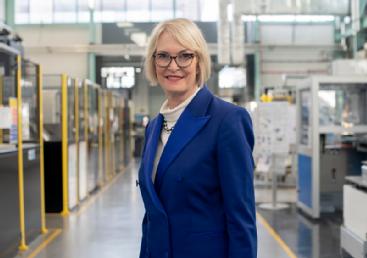 Margot James, Executive Chair of WMG, at the University of Warwick, commented on the Regional GDP figures released today by the Office of National Statistics, saying:
Margot James, Executive Chair of WMG, at the University of Warwick, commented on the Regional GDP figures released today by the Office of National Statistics, saying:
“It’s great news that the West Midlands made a strong return to growth in July to September 2020, with growth of 16.8% compared to April to June 2020, three months that covered much of the first lockdown.
However, despite this return to growth, the data shows our regional economy, was the most affected by the pandemic of any part of England and Wales, with regional GDP down 11.3% compared to a year ago.
Much of this was driven by our manufacturing sector being down by 25.2% versus the same period in 2019, although the sector made a quick return to growth when compared to the previous quarter, with an increase of 18.5% against April-June 2020.
The rapid return to growth shows the resilience and strength of our regional economy and I’m confident that our makers have continued to recover over the months since the period covered by this data.
However, the scale of the economic shock in our region caused by the pandemic highlights the importance of supporting growth in the West Midlands by investing in the skills, research, and development and infrastructure needed to support entrepreneurs, attract investment and prepare businesses for the challenges of digitisation and the transition to a zero carbon economy. Attracting major investments like a Gigafactory to our region will be key to a strong recovery.”
Notes: The ONS release of Regional GDP is available here:
University of Warwick and WMG already on route with today’s CBI demand for “Greener Miles”
 The University of Warwick is not just backing today’s CBI report ‘Greener Miles: Delivering on a net-zero vision for commuting’ – which calls on businesses to shoulder greater responsibility for ensuring their workers adopting greener travel habits – it has already taken action. The University of Warwick is already on route with a two year extensive programme to cut personal car use on campus and therefore reduce emissions. WMG, at the University of Warwick, is also deep into a suite of intense research programmes that will help industry, the public sector and consumers across the UK and beyond find sustainable transport solutions which will cut emissions.
The University of Warwick is not just backing today’s CBI report ‘Greener Miles: Delivering on a net-zero vision for commuting’ – which calls on businesses to shoulder greater responsibility for ensuring their workers adopting greener travel habits – it has already taken action. The University of Warwick is already on route with a two year extensive programme to cut personal car use on campus and therefore reduce emissions. WMG, at the University of Warwick, is also deep into a suite of intense research programmes that will help industry, the public sector and consumers across the UK and beyond find sustainable transport solutions which will cut emissions.
The new report published today (Friday 30th April 2021) by the CBI and KPMG and entitled Greener Miles: Delivering on a net-zero vision for commuting – has proposed a series of recommendations designed to cut travel emissions ahead of the Government’s upcoming Transport Decarbonisation Plan. Key among those recommendations is a call for businesses to shoulder greater responsibility for ensuring their workers adopt greener travel habits.
In fact, Transport for West Midlands (TfWM), part of the West Midlands Combined Authority (WMCA), has already teamed up with the University of Warwick on a two-year programme to do just that:
E-scooters, buses on demand, Enterprise Car Club vehicles and the Betterpoints sustainable travel app are just some of the innovative transport projects that form part of this two-year ‘Choose Your Way Warwick’ trial encouraging participants to adopt more sustainable transport choices and receive rewards for greener travel.
The trial will look at how the use of new transport solutions like e-scooters, or a car club can affect travel behaviour and replace traditional car use in and around the University campus area.
The projects include:
- Voi Technology, the UK’s leading e-scooter operator, has brought e-scooters to the University of Warwick campus as part of a pilot research project to help inform Government e-scooter legislation in the UK and research into micro-mobility.
- Membership of Enterprise Car Club with access to two low emission Hyundai Ioniq cars, for use by staff, students and the local community (subsidised for staff). The vehicles can be booked for anything from half an hour to a full day. As well as the two car club vehicles, members can also use any of the car club’s 1,400 vehicles around the UK and access the wide range of vehicles from Enterprise’s daily rental fleet.
- The West Midlands on Demand responsive bus service operates in a similar way to a taxi The convenience of the DRT will make it easier for the local community, staff and students to use public transport where a traditional bus service may not be appropriate.
The University has also made a travel policy commitment sets out that travel by train is to be the default mode of transport for journeys under 6 hours and a departmental ‘green levy’ will be charged for any air travel.
The University of Warwick’s Provost Professor Chris Ennew said of this and all the University’s sustainability initiatives:
“Warwick has always been a forward-facing university and today is no different. We know the way ahead has to lead to a better, more sustainable, relationship between people and the planet. As one of the region’s largest employers, we know Warwick has a critical role to play. We have a responsibility as a community and organisation to moderate our individual actions, our research and teaching, and how we run and develop our University. We aim to reach net zero carbon from our direct emissions and the energy we buy by 2030 and to achieve net Zero carbon emissions from emissions arising from procured goods and services by 2050.”
WMG, at the University of Warwick, are also already working with companies and organisations on a range of research programmes to support the sort of sustainable transport that will help deliver the “net-zero vision for commuting” sought in today’s CBI report and the governments Ten Point plan.
Professor David Greenwood, Professor of Advanced Propulsion Systems in WMG said:
“As the UK transitions to net zero carbon by 2050, we must ask whether and how we will commute to work in the future. A personally owned car will not be the only possible answer, and alongside our work on electrifying cars, WMG has strong interests in light rail solutions as well as increasingly autonomous vehicles. Two-wheelers and micromobility will also have a more important role to play, and our research here includes consideration of future regulation and road infrastructure as well as vehicle development and trials. All of these rely on batteries and electrification which also form a significant part of our research portfolio. “
Here are just three of WMG’s sustainable transport research projects:
· Coventry Very Light Rail tours its future home
· Novel e-assisted cargo trike launched (warwick.ac.uk)
· Pod research opens up a swarm of market opportunities for Aurrigo (warwick.ac.uk)
Note for Editors
For further information please contact:
Peter Dunn, Director of Press and Media Relations
Chief Communications Officer’s Group, University of Warwick
Mobile/Cell: 07767 655860 UK +44 (0)7767 655860 International
Email p.j.dunn@warwick.ac.uk
30th April 2021
WMG Professor appointed as Pro-Vice-Chancellor (Research)
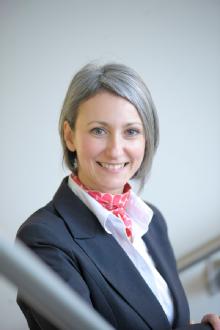 Congratulations to Professor Caroline Meyer who has been appointed as Pro-Vice-Chancellor (Research) with effect from 1 August 2021.
Congratulations to Professor Caroline Meyer who has been appointed as Pro-Vice-Chancellor (Research) with effect from 1 August 2021.
Caroline will be responsible for the academic leadership of the research strategy at the University of Warwick. Working with the Research Executive, she will take forward our commitment to research that is internationally recognised, interdisciplinary, and has impact and purpose. She will lead the University’s developments following REF 2021, and she will progress our research themes, Global Research Priorities programme and network of research centres and partnerships.
Caroline is currently Vice-Provost and Chair of the Faculty of Science, Engineering and Medicine. She is also Professor of Psychology at WMG. Her research is focused on mental health; primarily eating disorders and workforce mental health and productivity. She is Warwick PI on the Midlands Engine-Funded Mental Health and Productivity Pilot.
Commenting on her new role, Professor Meyer said: “I am thrilled to be taking on this role at Warwick. We have researchers across arts, social sciences, science, engineering and medicine conducting amazing, world-changing research and I am looking forward to supporting and promoting their endeavours.”
Professor Stuart Croft, Vice-Chancellor, said: “I’m delighted that Professor Meyer will be joining the Executive Board to build on the excellent work of Professor Pam Thomas in leading our ambitious research strategy. Caroline’s extensive knowledge of working with a wide range of external partners including the NHS and industry nationally and internationally will be invaluable as we build on our performance in REF2021, and continue to undertake excellent research that will transform the way we understand the world, creating lives that are healthier, safer, more resilient, just and fulfilled.”
Expert comment on changing the highway code to allow ALKS
Following the news today that "Motorists will be permitted to check e-mails and even watch TV at the wheel" under plans to legalise driverless ALKS (Automated Lane Keeping Systems) technology by the end of the year, Dr Siddartha Khastgir from WMG, University of Warwick shares his thoughts on changing the Highway code to enable motorists on the motorway to rely on technology with no human input when travelling at speeds under 37mph.
 Dr Siddartha Khastgir, from WMG, University of Warwick comments:
Dr Siddartha Khastgir, from WMG, University of Warwick comments:
"We welcome the UK Government publishing the results of the Call for Evidence for Automated Lane Keeping System (ALKS) from last year. ALKS is an important step on our journey to introduce self-driving car technology on UK roads. However, It is important to highlight that:
ALKS ≠ Self-driving car system. It is an important step on our journey to having self-driving cars.
Having said that, ALKS as a technology has a potential to provide lots of benefits but there are a few things that manufacturers, government/regulators and drivers need to be responsible for:
Regulators: Create a robust approval process for ensuring safety of ALKS. Ensure public education and any marketing of ALKS is done accurately and not mislead public.
Manufacturers: Establish and communicate true capabilities and limitations. This includes an elaborate and accurate representation of the Operational Design Domain (ODD) (i.e. operating conditions) of the vehicle
Drivers: Understand when they can and can not engage in activities like texting, send emails, watching movies etc. and their responsibilities when the system is active.
These are fundamental to ensuring safe introduction of ALKS and ensuring we reap the benefits."
ENDS
28 APRIL 2021
Bhattacharyya Award for university/industry collaboration opens for entries
WMG, at the University of Warwick and The Royal Academy of Engineering are inviting entries for a new annual award to celebrate collaboration between UK academics and industry. With a cash prize of £25,000, the Bhattacharyya Award will be presented to the team who best demonstrate how industry and universities can work together. Entries must be submitted by 31 May 2021.
The Bhattacharyya Award is funded by the Department for Business, Energy and Industrial Strategy and was announced in July 2019 and as a tribute to Professor Lord Kumar Bhattacharyya KT CBE FREng FRS, the Regius Professor of Manufacturing at the University of Warwick and founder of WMG.
Starting his career as a graduate apprentice at Lucas Industries, Professor Lord Bhattacharyya became Britain's first ever Professor of Manufacturing. Having seen first-hand how slowly academic advances were translated into real business and social change, he founded WMG in 1980 to help business innovate and help university researchers change our lives. Academic excellence with industrial relevance has always been at the heart of WMG, and today, it is one of the world’s top applied research centres, with a reputation for academic excellence and business results spanning the globe.
The Bhattacharyya Award is open to all UK universities and colleges, which are invited to submit a single entry in this round. Entries may be based on any field but must provide evidence of sustained, strategic collaboration over at least five years that is still active at the point of submission and has spanned multiple projects, grants and activities. The collaboration should be focused around an academic team and one or more declared industrial partners – it should not be restricted to a single lead academic but may reflect a wide institutional partnership.
Margot James, Executive Chair at WMG, University of Warwick said “The Bhattacharyya Award amplifies the approach Professor Lord Bhattacharyya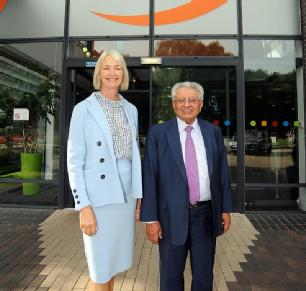 took in revolutionising how universities research and educate to meet the needs of industry and society. Relevant and impactful research is the product of genuine collaboration; also enabling education programmes that nurture the brightest talent. We are looking forward to seeing a wide range of entries which exemplify the very best of university/industry collaboration.”
took in revolutionising how universities research and educate to meet the needs of industry and society. Relevant and impactful research is the product of genuine collaboration; also enabling education programmes that nurture the brightest talent. We are looking forward to seeing a wide range of entries which exemplify the very best of university/industry collaboration.”
Science Minister, Amanda Solloway said: "We are extremely proud to be funding the Bhattacharyya Award, which encourages collaboration between our fantastic universities and businesses. By working hand-in-hand, academic advances can be quickly translated to industry, bringing forward game-changing innovations and helping us to build back better from the pandemic."
Professor Dame Ann Dowling OM DBE FREng FRS, immediate past-President of the Royal Academy of Engineering, will chair the judging panel for the Bhattacharyya Award. She said: “Lord Bhattacharyya was a strong advocate of an effective industrial strategy, seeking a revitalisation of skills policy, a growth in apprenticeships, a focus on the impact of research and training and technology partnerships between industry and universities. We hope that this new award will showcase best practice in developing effective collaborations between universities and industry – and inspire productive new partnerships in the future.”
ENDS
27 APRIL 2021
NOTES TO EDITORS
Entries for the Bhattacharyya Award must be submitted by 16.00 on Monday 31 May 2021. Full details of the selection criteria and how to apply are available at https://www.raeng.org.uk/grants-prizes/grants/support-for-research/bhattacharyya-award/how-to-apply
For more information please contact:
Jane Sutton at the Royal Academy of Engineering
E: jane.sutton@raeng.org.uk; T: 020 7766 0636
or
Lisa Harding at WMG, University of Warwick
E: Lisa.Harding@warwick.ac.uk T: 07824 540 845
Smart dielectric elastomers for self-healing soft robots
- Soft robots must be made of a flexible and damage-tolerant material to avoid tearing
- Materials that can self-heal damages are therefore more desirable for soft robots
- A self-sensing and self-healing device that mimics a leaf’s motion has been made by researchers at WMG, University of Warwick – potential for soft robots
Robots that resemble organs are known as soft robots, and in order for them to function they must be made of a flexible material, however a material that can also heal itself would be a bonus if wear and tear was to occur. Researchers from WMG, University of Warwick have designed a self-healing polymers for such devices.
Soft robots, that resemble organs for example, need to be made with highly deformable materials that are capable of changes in shape to allow conformable physical contact for controlled manipulation on order to decrease the chances of mechanical damage – such as tears and punctures.
This had led to a wide interest into the development of self-healing materials and actuators, in particular, the integration of self-healing polymers for bioinspired soft self-healing devices, which are lightweight, low cost and easily processed.
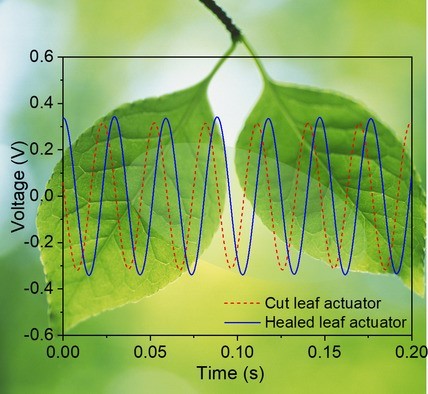 As an invited Communication by the journal Advanced Intelligent Systems, the work on ‘Piezoelectric-driven self-sensing leaf-mimic actuator enabled by integration of a self-healing dielectric elastomer and a piezoelectric composite’, was published on 22 March, 2021, led by the researchers from WMG, University of Warwick have designed a novel self-healing leaf-motion mimic material.
As an invited Communication by the journal Advanced Intelligent Systems, the work on ‘Piezoelectric-driven self-sensing leaf-mimic actuator enabled by integration of a self-healing dielectric elastomer and a piezoelectric composite’, was published on 22 March, 2021, led by the researchers from WMG, University of Warwick have designed a novel self-healing leaf-motion mimic material.
The material is made of an integrated thermoplastic methyl thioglycolate–modified styrene–butadiene–styrene elastomer (MGSBS) and piezoelectric macro fiber composite (MFC) for self-sensing applications.
The leaf-motion mimic actuator provides built-in dynamic sensing and self-healing capabilities to heal macroscale cutting damages with a room-temperature healing capacity and an intrinsic high bandwidth up to 10 kHz.
A prototype of the piezoelectric driven self-healing leaf was cut, and left for 24 hours at room temperature, in that time it had healed itself, after 48 hours it was almost untraceable where the cut had been made.
Dr Chaoying Wan, from WMG, University of Warwick comments:
“We have demonstrated the feasibility and potential of the new actuator applied to complex soft autonomous systems. This new material could fill a gap in the robotics-market, as the self-healing soft actuators can sense and repair themselves, creating new damage resistance in soft robotics.
“An example of where they could be used could be in a factory or hospital, they may get damaged from general wear and tear but can heal themselves and therefore do not need to come off duty to be fixed, therefore saving time and resources.”
ENDS
27 APRIL 2021
NOTES TO EDITORS
High-res images available at:
https://warwick.ac.uk/services/communications/medialibrary/images/april_2021/chaotying_image.jpg
Caption: Time and Voltage of a cut-leaf actuator and healed leaf actuator
Credit: WMG, University of Warwick
Paper available to view at: https://onlinelibrary.wiley.com/doi/10.1002/aisy.202000248
For further information please contact:
Alice Scott
Media Relations Manager – Science
University of Warwick
Tel: +44 (0) 7920 531 221
E-mail: alice.j.scott@warwickac.uk
Chitin can be successfully extracted from Black Soldier Fly husks
- Chitin comes from the husks of Black Soldier Fly Larvae, which are waste products of black soldier fly farming
- Black soldier fly farming is commonly done in parts of Africa and South East Asia, as they are used as a source of protein for livestock, therefore, to be able to use the husks could create a new economic opportunity
- The extraction process gives comparable quality material to other feedstocks, and extracts 50% of the available chitin in the husks researchers from WMG, University of Warwick have found
Chitin is a naturally occurring polymer from the husks of Black Soldier Fly larvae, usually considered a waste product from the farming of the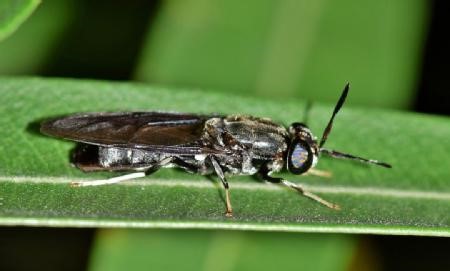 Black Soldier Fly larvae. However, researchers from WMG at the University of Warwick decided to see if they could extract chitin from the husks, creating a new economic opportunity.
Black Soldier Fly larvae. However, researchers from WMG at the University of Warwick decided to see if they could extract chitin from the husks, creating a new economic opportunity.
Chitin is a sustainable source of protein in countries in South East Asia and south parts of Africa. When extracted it can be characterised and used in the biomedical industry, for example to make antiseptics and anticancer treatments.
In the report, ‘Purification of chitin from Black Soldier Fly larvae husks’, researchers from WMG at the University of Warwick have successfully extracted chitin from the husks of Black Fly Soldiers.
The extraction route developed in this work obtains around 50% of the total available chitin, which is comparable to existing processes.
Dr Stuart Coles, from WMG at the University of Warwick comments:
“We have found a new way of extracting chitin from the husks of Black Soldier Flies, which are commonly farmed in parts of Africa and South East Asia as they can be used as a source of protein for livestock.
“Chitin can be used to make antiseptics and anticancer treatments, so to be able to extract it from the husks which are a by-product of the farming process means that there’s potential to be more sustainable by using what would usually go to waste.”
The extraction process that the researchers developed at WMG used cheap and readily available materials to reduce the cost whilst still producing a high-quality material.
Dr Stuart Coles explains:
“The process involved the use of mild, readily available and inexpensive chemicals to breakdown the natural structure of the husk and allowed us to isolate the chitin. In isolating the chitin, we only used water as a solvent, and a large part of our work focused on reducing the amount of water being used as it is a critical resource in countries where Black Soldier Flies are farmed.”
Research can now continue to investigate how to commercialise the extraction process into a larger process.
ENDS
27 APRIL 2021
NOTES TO EDITORS
High-res images available at:
https://warwick.ac.uk/services/communications/medialibrary/images/april_2021/fly-1627592_1920.jpg
Caption: A Black Soldier Fly
Credit: Brett Hondow, Pixabay
For further information please contact:
Alice Scott
Media Relations Manager – Science
University of Warwick
Tel: +44 (0) 7920 531 221
E-mail: alice.j.scott@warwick.ac.uk
WMG Associate Professor pledges her support to the Jubilee Sailing Trust
Despite the constraints of the COVID19 pandemic WMG Associate Professor, Mairi Macintyre, was still able to fulfil her annual volunteer commitments to the Jubilee Sailing Trust earlier this year.
Mairi has been supporting the sailing charity since 2012 using her annual leave to board the tall ship and enjoy sailing adventures around the world. Over the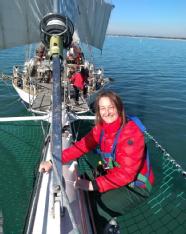 past nine years Mairi, alongside mixed ability colleagues, has taken on various roles including that of a bosun’s mate, an engineer and as a general crew member.
past nine years Mairi, alongside mixed ability colleagues, has taken on various roles including that of a bosun’s mate, an engineer and as a general crew member.
In February’s voyage, the Jubilee Sailing Trust hosted Royal Navy cadets for an essential leadership training exercise with crew members (including Mairi) and cadets forming a bubble on a week-long trip from Portsmouth.
Mairi explained: “The ship prioritises the ability to draw out everyone’s potential, we are all different and always stronger as a crew rather than any individual. Finding ways to enable everyone to find their best selves is what the ship does in spades. This lesson to me is so important to bring to my classroom, and it’s just great fun!”
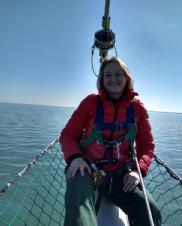 As well as a huge personal achievement, Mairi’s vast volunteering has also enabled her to build fantastic relationships with the Trust, and in turn identify some fantastic research opportunities for University of Warwick students.
As well as a huge personal achievement, Mairi’s vast volunteering has also enabled her to build fantastic relationships with the Trust, and in turn identify some fantastic research opportunities for University of Warwick students.
One such example is the work of WMG student Tanin Aparimarn. In 2019 he was able to work alongside the Trust creating a 3D printed version of a ship, a VR experience and an app tour for mixed ability people to experience what it’s like on board.
Patrick Fleming, Chief Executive, Jubilee Sailing Trust explains: "The Jubilee Sailing Trust has been committed to providing life changing opportunities to disabled and able bodied people of all ages from all walks of life to experience inclusive tall ship voyages for more than four decades. We are determined to ensure that we work with those in further education to provide onshore and on sea experiences that enhance both learning, leadership and employment opportunities."
Find out more about the Jubilee Sailing Trust and volunteer opportunities here: https://jst.org.uk/
